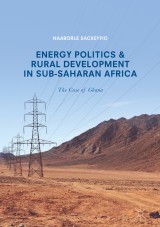Details

Energy Politics and Rural Development in Sub-Saharan Africa
The Case of Ghana|
85,59 € |
|
| Verlag: | Palgrave Macmillan |
| Format: | |
| Veröffentl.: | 26.09.2017 |
| ISBN/EAN: | 9783319601229 |
| Sprache: | englisch |
Dieses eBook enthält ein Wasserzeichen.
Beschreibungen
This book addresses the paradox of uneven electricity in one of the fastest growing and now petro rich economies, Ghana, by addressing the question of why one of the most hydro rich countries in sub-Saharan Africa produces irregular access for all but ‘swing’ voter regions of the country. The book questions why targeted rural electricity initiatives over the course of the last two decades have yielded uneven benefits for what is a substantial portion of the country’s population. Using Ghana as an emblematic case-study that speaks to broader regional concerns, including those of Nigeria and South Africa, this book contextualizes the variegated nature of how power sector reforms could not be undertaken without significant political costs. Indeed, the book situates an unfolding political landscape that prompted the successful but partial implementation of power sector reforms in part prompted by the Washington consensus and undergirded by a shrinking role for the state in the wider economy.
1. Introduction<div><br><div>2. Decentralization and Public Service Delivery in Ghana's Fourth Republic </div><div><br></div><div>3. The Historical-Institutional Context for Electrification and Power Sector Reform in Ghana: 1992-2008</div><div><br></div><div>4. The Unfolding Nature of the Rural Poor, Rural Development and Public Service Delivery of Electricity in Ghana’s Fourth Republic </div><div><br></div><div>5. The Numbers Game: Quantifying Access and Regional Differentiation in Electricity Provision in the Fourth Republic </div><div><br></div><div>6. The Politics of Energy in Comparative Perspective: Nigeria and South Africa</div><div><br></div><div>7. Conclusion</div><div><br></div></div>
<b>Naaborle Sackeyfio </b>is Assistant Professor in the Department of Global and Intercultural Studies at Miami University in Oxford, Ohio, USA.
This book addresses the paradox of uneven electricity in one of the fastest growing and now petro rich economies, Ghana, by addressing the question of why one of the most hydro rich countries in sub-Saharan Africa produces irregular access for all but ‘swing’ voter regions of the country. The book questions why targeted rural electricity initiatives over the course of the last two decades have yielded uneven benefits for what is a substantial portion of the country’s population. Using Ghana as an emblematic case-study that speaks to broader regional concerns, including those of Nigeria and South Africa, this book contextualizes the variegated nature of how power sector reforms could not be undertaken without significant political costs. Indeed, the book situates an unfolding political landscape that prompted the successful but partial implementation of power sector reforms in part prompted by the Washington consensus and undergirded by a shrinking role for the state in the wider economy.<div><b><br></b></div><div><b>Naaborle Sackeyfio</b> is Assistant Professor in the Department of Global and Intercultural Studies at Miami University in Oxford, Ohio, USA.</div><div><br></div>
<p>Deals with one of hottest topics in African politics today: the link between energy provision and rural development</p><p>Provides unique insights into how energy provision is used as an essential incentive to capturing votes in key regions</p><p>Draws an important link between internal and external power politics, and energy politics across sub-Saharan Africa</p>
“Electric energy development in Ghana is almost synonymous with development itself. As the first sub-Saharan Africa country to become self-governing in 1956 and independent in 1957, electrification efforts came to benefit diverse interests of Ghanaian society differently depending upon which interests were in power. Naaborle Sackeyfio explores those developments and asks the classic questions of political science of who benefits, how, and why. A prevailing dichotomy between rural and urban areas despite remarkable economic growth in recent years is a puzzle Sackeyfio also addresses while raising important issues about the meaning of class and populism in developing nations. In examining the relationship between hydropower and economic and political development in Ghana, this serious study makes a major, original contribution to an understanding of Ghanaian, African, and comparative politics.” (Irving Leonard Markovitz, Professor Emeritus, Department of Political Science, Queens College, USA)<p></p><div><p>“This study on energy politics and rural development in Ghana is an innovative and important contribution to the under-studied area of bridging the ‘electricity divide’ between city and village, and offers valuable lessons to developing countries in Africa and beyond.” (Adekeye Adebajo, Professor and Director of the Institute for Pan-African Thought and Conversation, University of Johannesburg, South Africa)</p></div>

















